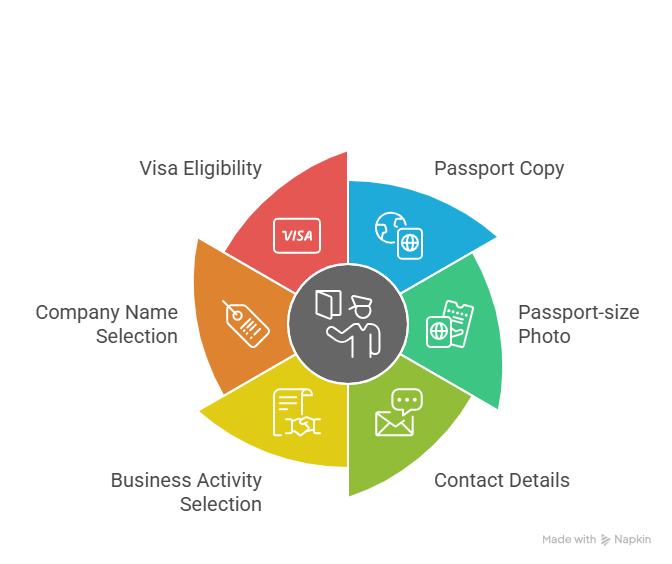Business Setup in Dubai Freezone :Cost & Requirements


Table of Contents
Key Takeaways:
- Dubai free zones offer a fast, flexible, and cost-efficient way to start a business with 100% foreign ownership and simpler requirements compared to mainland setups.
- The average setup cost ranges from AED 11,900 to AED 30,000+ ($3,240 to $8,170+), but the final price depends on visas, office space, business activity, and free zone choice.
- Proper documentation, the right activity selection, and realistic visa planning are essential, misjudging these often leads to delays and extra fees.
Why Dubai Free Zones are the Go-To Choice for Investors
If you’re planning to start a business in a Dubai free zone in 2025, you’re already thinking in the right direction.
According to data from Department of Economy and Tourism (DET), data from 2025 shows that free zones account for over 40% of business setups in the country.
Free zones continue to be investor favorites because they make business ownership simple: 100% foreign ownership, flexible licensing, quick approvals, and affordable setup options.
As a business setup consultancy with over a decade of expertise helping entrepreneurs launch in the UAE, we’ve seen a clear pattern: free zones are often the safest, fastest, and most cost-efficient choice for SMEs, startups, solopreneurs, and global companies entering the UAE for the first time.
But here’s the problem we’ve seen repeatedly: founders underestimate the actual cost of setting up a business in a Dubai free zone or misunderstand the requirements. This leads to delays, extra fees, and unnecessary back-and-forth.
This guide breaks it all down clearly: setup cost, documentation, business activity requirements, and everything free zones expect from you, without the technical jargon.
Dubai Free Zone Company Setup Cost (2025 Overview)
The cost of setting up a business in a Dubai free zone in 2025 typically ranges from AED 11,900 to AED 30,000+ ($3,240 to $8,170+) for a basic package that includes: a trade license, free zone establishment card, company name approval, and basic administrative fees. If you need visas, office space, or additional activities, the cost increases accordingly.

- Expert Experience: Most founders assume the cheapest package is the best one.
In reality, the “zero-visa” option often backfires because you’ll eventually need a visa for yourself, a manager, employees, and for corporate banking requirements.
It’s more cost-effective to choose a package that supports your real operational needs from day one.
Cost Breakdown: What You Actually Pay For
When you’re setting up a business in a Dubai free zone, your cost includes multiple components. Free zones often bundle these into packages, but understanding the breakdown helps you avoid surprises.
License Fees
The free zone license cost depends on your business activity (commercial, professional, e-commerce, or industrial).
Typical range: AED 5,750 to 15,000 (~$1,560 to $4,080)
Business Activity Fees
Some activities are standard. Others like crypto, fintech, pharma, media, or import/export carry higher fees.
Costs vary by activity, usually added on top of license fees.
Establishment Card
Required for visa issuance and immigration processing.
Typical range: AED 525 to 2,000 (~$143 to $545)
Office Space or Flexi Desk
Some free zones do not allow you to operate without a physical desk.
Typical range: AED 4,000 to AED 15,000 per year (~$1,090 to $4,080)
Visa Fees
Through a free zone business, you can apply for a visa for yourself or employees and dependents.
Typical range: AED 3,750 to 7,500 per visa (~$1,020 to $2,040)
Medical Insurance + Emirates ID
Mandatory for all visa holders.
Typical range: AED 1,200 to AED 2,500 (~$327 to $680)
Bank Account Opening Support (optional)
Most consultants offer this as part of the package. Usually bundled or charged separately, depending on the provider.
Key Factors that Influence Dubai Free Zone Setup Costs
Your final cost depends on the following components.
Free Zone Type
Premium free zones like DMCC cost more than budget-friendly ones like SHAMS or RAKEZ.
Business Activity
IT consultancy is cheaper, whereas crypto activity is more expensive. On the other hand, import/export depends on warehouse needs.
Visa Requirements
The formula that sums it up: more visas = higher license cost + more office space required.
Office Type
Flexi desk → shared space → private office → warehouse. Each step increases the cost.
Number of Shareholders
Some free zones charge extra for multi-shareholder structures.
Additional Approvals
Media, real estate, health, and education activities may require third-party approvals.
Dubai Free Zone Company Requirements (At a Glance)
Almost every free zone in the UAE requires the following:

But depending on your business activity and free zone, further documentation may be required.
Detailed Documentation Requirements
Here’s what you will typically need during setting up a business in a Dubai free zone:
Passport Copy
Must be valid for at least 6 months.
Passport-Sized Photograph
UAE-sized with a white background.
Business Plan (sometimes optional)
Some free zones require it for finance, media, trading, or high-risk categories.
No Objection Certificate (if currently employed)
Needed only if you're applying for a visa under your name.
Proof of Address
Utility bill or bank statement, depending on the free zone.
Corporate Documents (if shareholder is a company)
- Certificate of incorporation
- Memorandum of Association
- Board resolution to establish the UAE entity
Bank Reference Letter (in rare cases)
High-risk industries sometimes need this.
- Expert tip: If you're a solo founder, choose a free zone with simplified documentation. DIFC, DMCC, and ADGM require stricter paperwork; SHAMS, IFZA, and SPCFZ are much faster and simpler.
Business Activity Requirements You Must Meet
Every free zone will check if your business activity matches their approved activity list, fits within your chosen license category, and meets any sector-specific compliance requirements.
For instance, an e-commerce will be requested to share its website details. A media business will be required to share a portfolio or sample work. A consulting business will be asked to submit their CV or experience proof. An import/export will be required to share their storage or warehouse plans.
- Expert insight: Make sure your activity list is correct, as changing it later costs money and delays your license.
Requirements for Shareholders & Company Structure
- Expert advice: If you’re unsure between a single-owner or multi-owner setup, always start with one shareholder. You can add others later for a small fee, but removing a shareholder is far more complicated.
Business Setup in a Dubai Free Zone with RadiantBiz
Setting up a business in a Dubai free zone is a smart decision. Before you make this move, our RadiantBiz consultants guide you through a thorough assessment process to determine not only the most suitable business jurisdiction but also the most appropriate free zone based on your business goals, model, target market, and budget.
Once the appropriate zone is identified, we carry out a detailed requirements check, ensuring your business's feasibility and alignment with the free zone framework. During this process, our consultants also analyze your budget to verify whether it is realistic, preventing any overestimation or underestimation that could lead to surprises later.
We then negotiate the best terms for your business with the free zone authorities, handle document submission, manage payment settlements, and ensure your business is up and running efficiently.
FAQs
1. What is the Average Cost of Setting Up a Business in a Dubai Free Zone?
Most entrepreneurs spend between AED 11,900 and AED 30,000 (~$3,210 to $8,100), depending on their visa needs, business activity, and choice of free zone.
2. How Long Does it Take to Get a Free Zone License?
Between 2 hours to 5 working days. Some zones offer instant licenses for simple activities.
3. Do I Need to Live in the UAE to Open a Free Zone Company?
No, you can open it remotely. However, if you need a visa, you’ll need to enter the UAE for medical and biometrics.
What to Prepare and Budget for a Free Zone Setup
Setting up a business in a Dubai free zone is one of the most straightforward ways to enter the UAE market, but only if you understand the actual costs and requirements.
Here’s a checklist:
- Choosing the right free zone
- Selecting the correct business activity
- Preparing the required documents
- Budgeting realistically
- Planning visa requirements early
- Ensuring your company structure supports your long-term goals
If you want clarity on costs or need help choosing the right free zone, seek our professional on-the-ground guidance, contact us via mail at info@radiantbiz.com, WhatsApp, or call us at +971521322895!



2.png)




.avif)